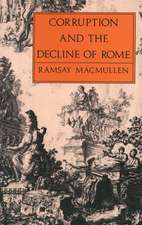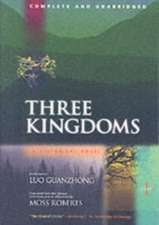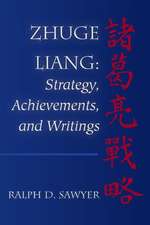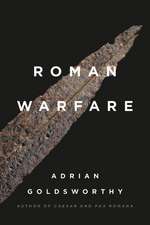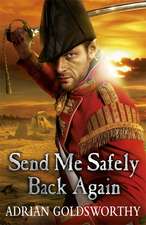How Rome Fell: Death of a Superpower
Autor Adrian Goldsworthyen Limba Engleză Paperback – 28 sep 2010
A major new history of the fall of the Roman Empire, by the prizewinning author of Caesar
In AD 200, the Roman Empire seemed unassailable, its vast territory accounting for most of the known world. By the end of the fifth century, Roman rule had vanished in western Europe and much of northern Africa, and only a shrunken Eastern Empire remained. In his account of the fall of the Roman Empire, prizewinning author Adrian Goldsworthy examines the painful centuries of the superpower’s decline. Bringing history to life through the stories of the men, women, heroes, and villains involved, the author uncovers surprising lessons about the rise and fall of great nations.
This was a period of remarkable personalities, from the philosopher-emperor Marcus Aurelius to emperors like Diocletian, who portrayed themselves as tough, even brutal, soldiers. It was a time of revolutionary ideas, especially in religion, as Christianity went from persecuted sect to the religion of state and emperors. Goldsworthy pays particular attention to the willingness of Roman soldiers to fight and kill each other. Ultimately, this is the story of how an empire without a serious rival rotted from within, its rulers and institutions putting short-term ambition and personal survival over the wider good of the state.
In AD 200, the Roman Empire seemed unassailable, its vast territory accounting for most of the known world. By the end of the fifth century, Roman rule had vanished in western Europe and much of northern Africa, and only a shrunken Eastern Empire remained. In his account of the fall of the Roman Empire, prizewinning author Adrian Goldsworthy examines the painful centuries of the superpower’s decline. Bringing history to life through the stories of the men, women, heroes, and villains involved, the author uncovers surprising lessons about the rise and fall of great nations.
This was a period of remarkable personalities, from the philosopher-emperor Marcus Aurelius to emperors like Diocletian, who portrayed themselves as tough, even brutal, soldiers. It was a time of revolutionary ideas, especially in religion, as Christianity went from persecuted sect to the religion of state and emperors. Goldsworthy pays particular attention to the willingness of Roman soldiers to fight and kill each other. Ultimately, this is the story of how an empire without a serious rival rotted from within, its rulers and institutions putting short-term ambition and personal survival over the wider good of the state.
Preț: 163.94 lei
Nou
Puncte Express: 246
Preț estimativ în valută:
31.37€ • 32.84$ • 25.96£
31.37€ • 32.84$ • 25.96£
Carte disponibilă
Livrare economică 15-29 martie
Preluare comenzi: 021 569.72.76
Specificații
ISBN-13: 9780300164268
ISBN-10: 0300164262
Pagini: 560
Ilustrații: 33 b-w illus.
Dimensiuni: 156 x 235 x 41 mm
Greutate: 0.79 kg
Editura: Yale University Press
Colecția Yale University Press
ISBN-10: 0300164262
Pagini: 560
Ilustrații: 33 b-w illus.
Dimensiuni: 156 x 235 x 41 mm
Greutate: 0.79 kg
Editura: Yale University Press
Colecția Yale University Press
Recenzii
"Goldsworthy . . . claims the empire's fatal move was to make the centre of authority—Rome and its experienced senatorial government—irrelevant. . . . Goldsworthy's expertise guarantees his clearly and powerfully articulated thesis will open up the debate all over again."—Peter Jones, Telegraph
"Meticulously researched, complex and thought-provoking."—Diana Preston, The Washington Post Book World (Best of 2009 Review)
"Goldsworthy gives a vivid account. . . . [he] tells us clearly and well—and without attempts at literary majesty—about the series of events that brought Rome’s western empire to a state of collapse."—Wall Street Journal
"On a more profound level, Goldsworthy has depicted the grim process by which the Res Publica, the common good of the Roman many, was sacrificed for the self-preservation of the Imperial few, leading in due course to the destruction of all."—California Literary Review
"As in Caesar, Goldsworthy excels at recounting important battles. Where many accounts only briefly cover the Battle of Adrianople in 378, Goldsworthy provides a detailed discussion of the battle itself and the aftermath of the catastrophic Roman defeat. Descriptions of military maneuvering and organization are not unduly technical for the lay reader and are supplemented by accessible charts and maps."—Daniel Larison, The American Conservative
"Goldsworthy's writing is easy to follow, sometimes almost conversational in tone without being overly colloquial. How Rome Fell is both enjoyable and thought-provoking."—Carolyn Nelson, The Journal of Military History
"How Rome Fell is an interesting and compelling analysis. It is definitely worth the price to obtain and the time to digest, even if you are not a student of classical history."—Brandon Crocker, The American Spectator
"A very important book for anyone interested in Roman history."—The NYMAS Review
"[A] masterful survey."—The New Criterion
". . . weaves a compelling narrative that has enough new research to keep even well seasoned 'Romanphiles' satisfied."—Washington Times
"Goldsworthy is one of the most productive, most readable of contemporary military historians of ancient Rome. . . . Excellent chronology, glossary, bibliography."—P. B. Harvey Jr., Choice
"A very important book for anyone interested in Roman history."—A. A. Nofl, strategypage.com
". . . hugely informative sections on military, economic, and sociological issues . . . terrific book."—Tony Lewis, Providence Sunday Journal
"Goldsworthy is not the first historian to note the self-destructiveness of Roman imperial and military institutions. He has, however, provided one of the most penetrating and well-written analyses of how this dysfunction led to the fall of the Roman Empire."—Daniel P. Murphy, Magill's Literary Annual 2010
Selected as one of the Best Books of 2009 in the World History category, Diana Preston, Washington Post Book World
"Adrian Goldsworthy is one of the new generation of young classicists who combines scholarship with storytelling to bring the ancient world to life."—Simon Sebag Montefiore
"Meticulously researched, complex and thought-provoking."—Diana Preston, The Washington Post Book World (Best of 2009 Review)
"Goldsworthy gives a vivid account. . . . [he] tells us clearly and well—and without attempts at literary majesty—about the series of events that brought Rome’s western empire to a state of collapse."—Wall Street Journal
"On a more profound level, Goldsworthy has depicted the grim process by which the Res Publica, the common good of the Roman many, was sacrificed for the self-preservation of the Imperial few, leading in due course to the destruction of all."—California Literary Review
"As in Caesar, Goldsworthy excels at recounting important battles. Where many accounts only briefly cover the Battle of Adrianople in 378, Goldsworthy provides a detailed discussion of the battle itself and the aftermath of the catastrophic Roman defeat. Descriptions of military maneuvering and organization are not unduly technical for the lay reader and are supplemented by accessible charts and maps."—Daniel Larison, The American Conservative
"Goldsworthy's writing is easy to follow, sometimes almost conversational in tone without being overly colloquial. How Rome Fell is both enjoyable and thought-provoking."—Carolyn Nelson, The Journal of Military History
"How Rome Fell is an interesting and compelling analysis. It is definitely worth the price to obtain and the time to digest, even if you are not a student of classical history."—Brandon Crocker, The American Spectator
"A very important book for anyone interested in Roman history."—The NYMAS Review
"[A] masterful survey."—The New Criterion
". . . weaves a compelling narrative that has enough new research to keep even well seasoned 'Romanphiles' satisfied."—Washington Times
"Goldsworthy is one of the most productive, most readable of contemporary military historians of ancient Rome. . . . Excellent chronology, glossary, bibliography."—P. B. Harvey Jr., Choice
"A very important book for anyone interested in Roman history."—A. A. Nofl, strategypage.com
". . . hugely informative sections on military, economic, and sociological issues . . . terrific book."—Tony Lewis, Providence Sunday Journal
"Goldsworthy is not the first historian to note the self-destructiveness of Roman imperial and military institutions. He has, however, provided one of the most penetrating and well-written analyses of how this dysfunction led to the fall of the Roman Empire."—Daniel P. Murphy, Magill's Literary Annual 2010
Selected as one of the Best Books of 2009 in the World History category, Diana Preston, Washington Post Book World
"Adrian Goldsworthy is one of the new generation of young classicists who combines scholarship with storytelling to bring the ancient world to life."—Simon Sebag Montefiore
Notă biografică
Adrian Goldsworthy is a preeminent historian of the ancient world. His many acclaimed works include Caesar, a New York Times Notable Book and winner of the Society of Military History’s Distinguished Book Award for Biography. Goldsworthy, who received his doctorate at Oxford, lectures widely and consults on historical documentaries produced by the History Channel, National Geographic, and the BBC.


